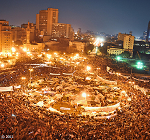The scenes that plagued Latin America through the 1980s bear a striking resemblance to those enveloping the Arab World since Mohamed Bouazizi set himself ablaze in Tunisia nearly 30 years later. In Latin America, street protests reflected the rising frustrations of the middle class, marketplaces were bombed by those angry at incumbent autocrats and citizens rallied against police brutality.
Within a decade, Latin America’s revolts had brought down 14 military dictators. Likewise, the Arab Spring’s cries for democracy have resonated in the region, bringing about regime change in Tunisia and Egypt, while 13 other countries across the Arab world continue to simmer with anger.
The two continents are geographies apart, but their political parallels run deep. In their pre-revolt period, both Latin American and the Arab nations had a youthful middle class population rising against authoritative regimes, fighting against human rights violations, mass unemployment and extreme poverty. The countries in each region were also united by language – Latin America with Spanish and Portuguese, the Arab world with Arabic and French. Significantly, neither revolt spread to a country that was not home to one of these languages.
There are other recent examples of democratisation, such as the post-Communist Eastern European nations, almost all of which are now part of the European Union (EU). But unlike Latin America, Eastern Europe had only a fragmented identity. For example, while Argentina, Chile and Peru share Spanish as a language and Catholicism as the dominant religion, Poland, Hungary and Romania speak Polish, Hungarian and Romanian and have religious identities ranging from Roman Catholic, Eastern Orthodox and Protestantism. In addition, the Helsinki Accord signed in 1975 by almost all European states catalyzed the transition of the newly democratized European countries. It provided the kind of institutional framework that Latin America did not have during transition.
The fall of Latin American military dictators was followed by periods of hyperinflation as the region plummeted into la década perdida (the lost decade), when debt restructuring and sovereign default was the norm for almost every Latin American nation. That pattern is repeating itself in the Arab states. In Egypt, the economy has shrunk 7% and a large chunk of the population still remains unemployed after the ouster of Hosni Mubarak’s regime. Now, in a familiar pattern, thousands of pro-reforms protesters have returned to Tahrir Square.
This is where the Latin American example can prove to be a useful guide. Despite its economic woes, Latin America pursued several policies that aided the region’s relatively successful transition to democracy. There are two important strategies that the Arab World can emulate:
First, Latin America increased education levels and reduced the gender gap. This was done largely through the use of social reforms such as ‘conditional cash transfers’, where citizens received funds from the government only if they participated in basic services. Nicaragua, for instance, achieved a 28.4% increase in primary education enrollment of children living in extreme poverty between 2002 and 2004.
To be fair, the Arab world has made an attempt at replicating such programs. In 2009, Morocco launched a pilot of its own conditional cash transfer program, Tayssir, financed with support from the World Bank. Egypt began a similar pilot in villages in 2009 with the state-funded Minhet El-Osra. Such programs may suit countries like Yemen and Libya, which have increasingly high birth rates and extremely low high school enrolment ratios, especially among girls.
Second, Latin America also provided its citizens a platform for addressing social grievances. In several countries this took the form of Truth and Reconciliation Commissions (TRC) to investigate human rights abuses and provide much-needed healing. Perú’s TRC, for instance, presented the findings of its report on human rights violations to the public in 2003. A year later, the government led by Alejandro Toledo appointed special prosecutors to investigate crimes committed since the 1980’s leading up to human rights violations of the impeached Fujimori government of 2000.
The monarchs of the Gulf nations will be reluctant to create similar investigative commissions but the successor governments in Tunisia and Egypt will see it as an opportunity to provide the transparency and justice that they have promised to their people. Libya’s rebel leaders have already expressed their intention of setting up a TRC as soon as the opportunity presents itself.
There is much that countries in transition can learn from each other. Parallels between Latin American and the Arab world’s current situation will stay as comparisons only, unless there is an active exchange of ideas. The Arab-South American Summit, brainchild of former Brazilian President Luiz Inácio Lula da Silva, may go some distance in facilitating that exchange. The first summit was held in 2005, and the second summit, in 2009, resulted in the adoption of an 11-point declaration on political affairs, the peace process in the Middle East, and economic cooperation. But the third summit, scheduled to take place in February 2011, has been postponed indefinately.
Tunisia’s and Egypt’s transition to democracy will be the litmus test for protesting Arab citizens. Its success – or failure – will determine whether the Arab Spring will wilt, or flower and follow the example of Latin America to become an impetus for lasting change.
Hari Seshasayee is a Researcher at Gateway House.
This article was exclusively written for Gateway House: Indian Council on Global Relations. You can read more exclusive content here.
For interview requests with the author, or for permission to republish, please contact outreach@gatewayhouse.in.
© Copyright 2011 Gateway House: Indian Council on Global Relations. All rights reserved. Any unauthorized copying or reproduction is strictly prohibited.


